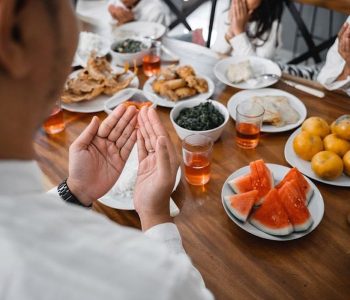
Eid Al-Fits is just around the corner and Indonesia is still struggling to contain the spread of Covid-19 in the countries as the new coronavirus cases have been reported every day with more than 20,000 people got infected by the novel respiratory disease. Since people have been practising physical distancing and social restrictions order for more than two months, Indonesia finds difficulties to control mobilisation of people in order to flatten the Covid-19 curve as people can’t maintain the protocols to prevents the virus from spreading.
Normally, Ramadan and Eid Al-Fitr in Indonesia are the two most important traditions to reconnect with family, friends, and neighbours where social bound among Muslims is shown by silaturahmi, mudik to hometown to visit the relatives, and the act of philanthropy to share gratitude with others. With the current situation happening right now, all of those traditions are restricted as the government mandate suggesting to limit social interaction to prevent the risk of spreading virus that already detected across the archipelago nation.
The public, in general, seems to ignore the guideline of physical distancing as the news reported the mass gathering in the traditional market, crowd flocking the street right before breakfasting time, a line of the passengers are inundating the airport and some other riding motorcycles to go back to their hometown. As the Jakarta government will be ending the social restriction on 8 June with another possibility of extending the period, major cases were found in the last few days with an average of 600 to 900 new Covid-19 patients each day. Now, Indonesia is ranked in 31st place in statistics with the highest death toll in East Asia outside China, sharing a total of more than 5 million cases in the world, according to Worldometer.
#IndonesiaTerserah #IndonesiaWhatever
Since mid-May, social media, Instagram and Twitter specifically, has hit by the storm, putting the hashtag #IndonesiaTerserah (translates to #IndonesiaWhatever) on-trend following with the hashtag #janganmudik as the public response to the government that couldn’t handle pandemic very well, causing public outrage about the ignorance of the people who violate the large-scale social restrictions order. Public anger has appeared among people who have been consistently practicing the order and felt unrespected by those undermining the health protocol during PSBB.

The coronavirus has killed 1,191 people in the country of nearly 270 million. Since March, 52 Indonesian health personnel including doctors and nurses have died from Covid-19. Indonesia is slower than neighbour countries to impose restrictions to contain the viral virus and is already discussing when to relax them, Reuters reported. The government received a lot of criticism from the public, accruing the government for not being consistent and clear on enforcing the regulation as well as lacking the effort on the distribution of the Covid-19 test.
Many people think that physical distancing is not worth fighting as health workers are laboring their time to break the chain of Covid-19, while on the other hand people just break the rules. In fact, East Java reported the surge of new cases after Jakarta surpasses the number to 3,129 (per 21 May), highest after Jakarta and West Java, making the province is now the epicenter of the virus with the emergence of the new cases reported daily.
Seriously, It Depends on Us
In defense, the government won’t give permission to ease the social restriction to local government if the curve is not flattened yet. Health minister spokesman Achmad Yurianto keeps reminding people that containing the Covid-19 needs public participation as the government can’t work alone.
In the latest press briefing at Bogor Palace, President Joko Widodo invites the community to be united and prioritise the safety of Indonesian people. “This Eid Al -Fitr, this year, requires our sacrifice. I know that EId Al-Fitr without mudik and gather with our families it is very hard. I am, my self, feel that but the safety of our friends (Handai Tolan) and relatives is the most important and it must be our priority,” Jokowi said.
Jokowi highlighted his statement, ask the public to think when Indonesia will end this pandemic, whether longer or sooner, it depends on people to respect the health protocols or not.
After the day of Eid Al-Fitr is announced, falling on 24 May, Chief Imam of Istiqlal Mosque H.H Nasaruddin Umar also invites the Indonesian Muslim community to suspend mudik, join takbir online, practice Eid pray at home, and invite ones through virtual social bound (silaturahmi) to connect with the family in hometown.
“Don’t make us a burden for our families at home. Our relatives are now safe in Kampung that has been isolated. If we go home as there is people will possibly get exposed by the virus We don’t know if the health centre could handle our loved ones if the pandemic spread to Kampung,” Ummar said at the press conference.
Health Protocol during Eid Celebration
This year, It might feel so strange to be in this situation where ones are supposed to meet their families at home for Eid but the pandemic forces us even not to practice a handshake on neighbour visit as the tradition can not be separated from the essence of Eid in Indonesia. Nothing to worry about, the Muslim community still can celebrate Eid without risking to spread the virus if only one concern about COvid-19 protocols. We, as humans do the best we can to adjust and adapt to the crisis, with no expectation with Eid Al-Fitr.
Here are what we can do:
- Stay at home. Refrain from visiting neighbors or relatives and do not gather in large masses as the highly recommended precaution to do during Eid.
- Conduct the Eid prayers at home, or for migrant students and workers, with your quarantine friends.
- Do not gather in a group of more than five as the large-scale social distancing (PSBB) bans large gatherings.
- Even if you urgently have to meet people, maintain physical distance at a minimum of one-meter among each other.
- Strictly refrain from shaking hands. It would not be worth the risk of contracting Covid-19.
- One can always conduct ‘silaturahmi’ in a virtual way as there are many video call apps available online. Seeing the image of your loved ones through your smartphone or computer device can slightly compensate for your homesickness.
- Maintain a good immune system by eating and drinking healthily as it can help one prevent from contracting to Covid-19.
- If there are situations where one cannot prevent visitors into the home, always prepare disinfectants and disinfect home after they leave as the act of precaution.






